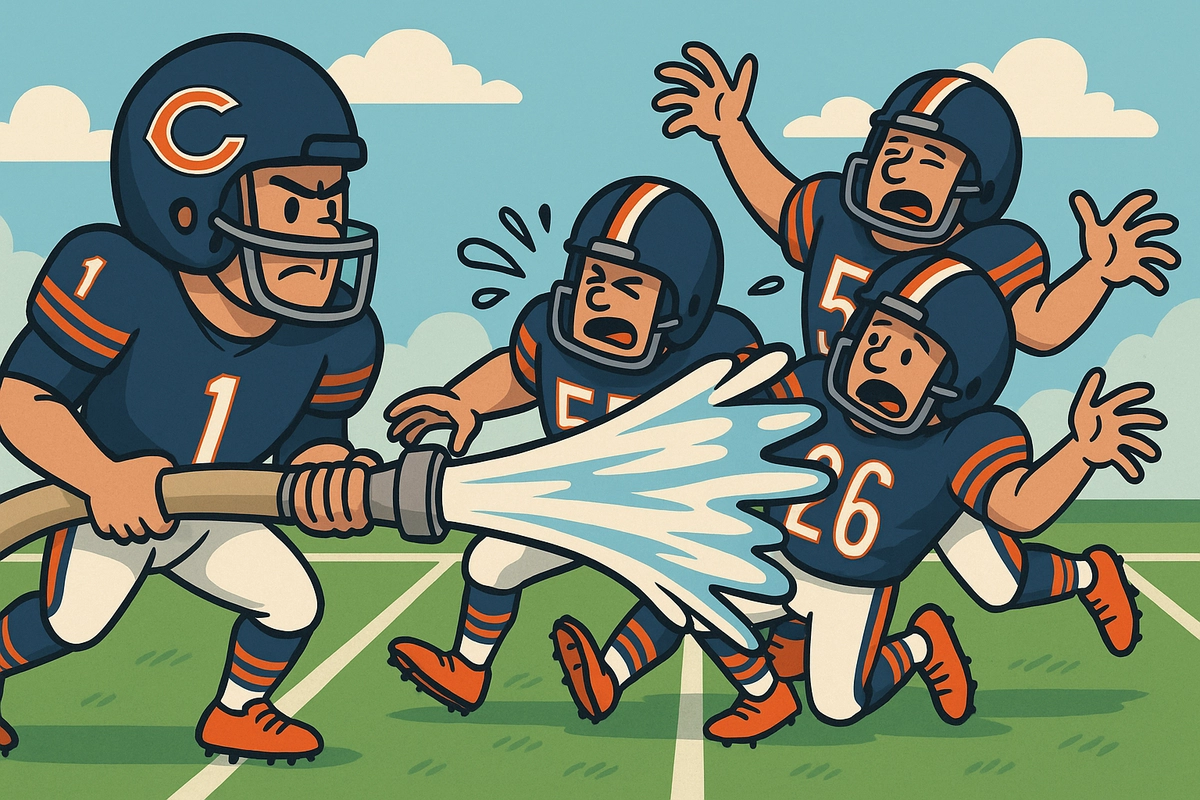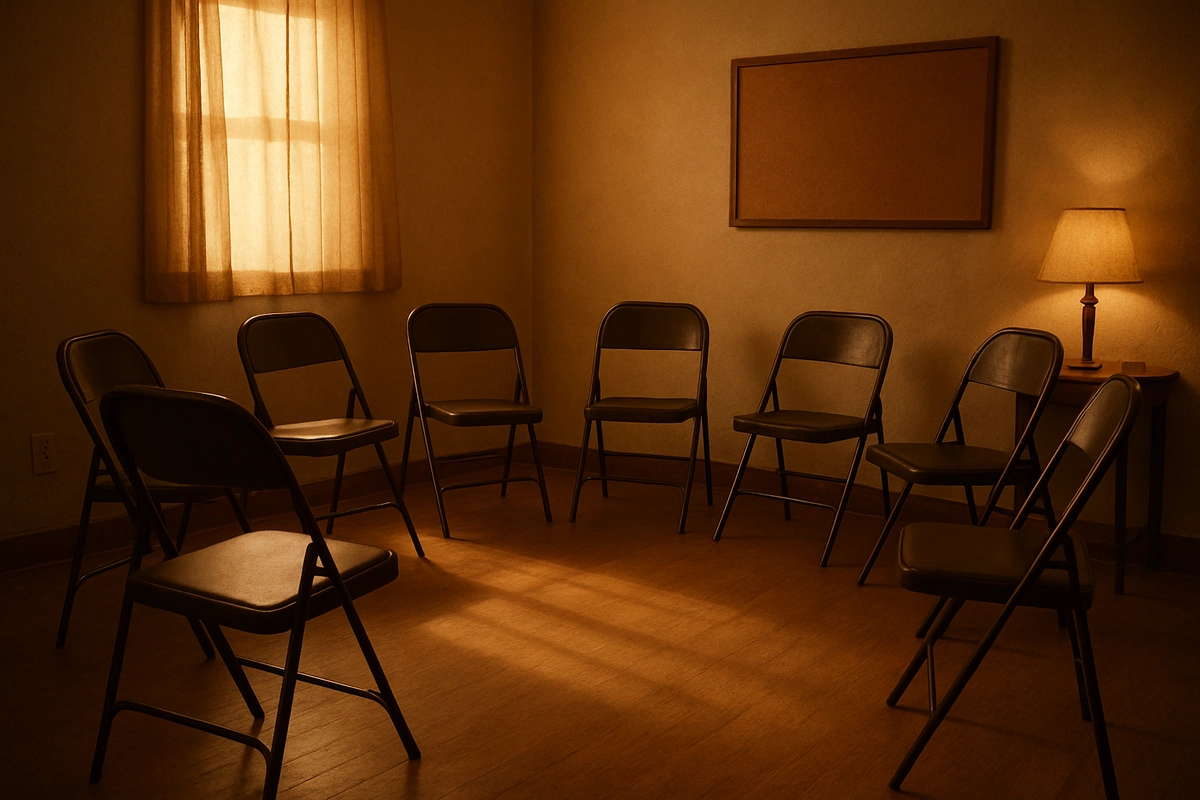📣This post was originally posted to X which is where this particular path began. I believe all alcoholics suffer from other challenges, mine is ADHD. This series will explain how my recovery and dealing with ADHD have become intertwined.
Two men, thirty years apart, saw the same thing in me that I couldn't see in myself.
The first was one of my managers at an insurance company in 1995—let’s call him “Nix”—who knew me intimately:
Guy, you thrive in chaos. When there's chaos and something needs handling, you're my guy. But when there's no chaos, or you're bored, god help us all.
The second was someone who didn't know me at all, @JayGlazer on @CHGOBears Super Bowl coverage in February 2025:
I'm great in chaos, I suck in calm—so business-wise I will cause chaos on purpose.
That's when an NFL insider I barely knew changed my entire life.
The Moment Everything Clicked
I was watching CHGO Bears coverage like I do every day during Super Bowl week—my usual football ritual. I expected fun interviews and celebrity spotlights, not a serious discussion about mental health. But when Jay started talking about his ADHD diagnosis from 1989, he began describing symptoms that felt eerily familiar.
Here's the moment that stopped me cold:
Jay went on to talk about the sense of drowning when something uninteresting was happening. How boredom drove him to disrupt class. The self-medication. Then came his finishing move: that line about chaos and calm that left me slack-jawed.
Everything he said was about me. But more importantly, it was an echo of something I'd heard three decades earlier.
On yesterday's show, we played our interview with @JayGlazer, who went into depth on mental health and how to open up about it.@GBraggsJr23 and @thecarm took a moment to react and reflect as well.
— CHGO Bears (@CHGO_Bears) February 12, 2025
Here's a friendly reminder that if you're going through something, it helps to… pic.twitter.com/rDtg3tk5YZ
The Pattern I'd Lived With for 30 Years
Those words hit me like a freight train because back in the mid-90s, I was working in claims at that insurance company, frustrated and stuck. I desperately wanted to become an adjuster (a hilarious “lofty” goal in hindsight) but couldn't understand why I wasn't moving up—I felt completely unchallenged.
That's when Nix took a moment to level with me. He’d watched me for months, seen how I performed under pressure versus during quiet periods. His assessment was brutally honest and, as it turned out, prophetic.
I never forgot what Nix said. So when Jay Glazer described himself the exact same way three decades later, it felt like the universe was finally giving me the answer I'd been searching for.
The Early Signs Were All There
Looking back, the pattern was obvious. There's one part I was a bit different from Jay or @GBraggsJr23 from CHGO Bears who also shared his struggles with ADHD. From an early age, I was really good at school—like, don't-even-need-to-try good. This was the 1970s and 80s, when I was moving through grade school and high school. I was in the first gifted program in our school district, we met in a janitor's closet.
In sixth grade, I had a teacher who should have retired a decade earlier. Bored to tears by her outdated methods, I created chaos challenging her knowledge and methods. She ended up having a nervous breakdown and leaving mid-year. I probably had something to do with that. At the time, I thought it was just bad luck. Now I see it was the first clear sign of the pattern Nix would identify years later.
High school brought more of the same, just with higher stakes. Despite being third in my class, I was denied entry to the National Honor Society. My favorite teacher later confided I had been vetoed by the Speech teacher who was the NHS advisor. I was shocked.
“How could that be?” I pleaded. “I aced that class!”
“Yes,” he said, “and you did it without trying, that infuriated her.”
He was right—I never prepared for speeches. I'd walk into class, realize I had one that day, scribble some notes on a piece of paper, and deliver an A-level performance every time. I was that cocky.
Research now shows that kids like me—high achievers who were bored and acting out—were flying completely under the radar. In the 70s and 80s, ADHD screenings focused on kids who were struggling academically. The assumption was that any kid doing well in school didn't have a problem, it was the “class clown” or distracted student.
They were very wrong about that.
College: Where Cockiness Meets Reality
I was so confident in my abilities that I barely studied for the SAT or ACT and still got decent scores. I turned down a three-year Navy ROTC scholarship because I was pissed I didn't get the four-year one. When people warned me college would be different, I laughed it off.
At USC from 1990-1992, I was a member of the Trojan Marching Band, my college rabbit hole. I attended virtually every sporting event, refused to take classes before 10 AM, and completely blew off group projects when I didn't like my team members. I figured I'd always find a way to make it work.
I was baffled when everyone warned me college would be harder—it felt effortless. I still pulled high grades, made Alpha Lambda Delta, and as a freshman was hand-picked for POSC-110g “Ideology and Political Conflict,” a small, dozen-student course led directly by one of USC’s most senior political science professors, where we read a book a week and engaged in roundtable discussions. As a sophomore, I was acing 400-level courses and finally felt challenged for the first time in my academic life. But here’s the thing about ADHD I didn’t understand then: I only performed when I was genuinely interested or under intense pressure.
Remove those elements, and everything fell apart.
When my cockiness finally caught up with me—I’d done zero work on scholarships beyond the one I’d turned down—and I ran out of money, I had to drop out. It hit me really fucking hard. The golden boy who never had to try suddenly couldn’t figure out how to succeed when success required sustained effort on things that didn’t immediately grab my attention. My parents were devastated, both emotionally and financially. I was devastated because none of it was their fault—I knew it was mine. I got a job at K-Mart.
I don't think I was the same person for decades after that experience.
The Rabbit Hole Superpower
What I didn't understand then—what Jay helped me see thirty years later—was that I had this incredible ability to dive deep into things that captured my interest. Not just focus, but hyperfocus to an almost supernatural degree.
Like Billy Chapel in For Love of the Game, I could "clear the mechanism" and shut out everything else when something had my full attention. But this superpower came with a massive downside: I was completely at its mercy.
I'd disappear down rabbit holes for hours, days, sometimes weeks. Learning everything there was to know about a particular subject, mastering a new skill, or solving a complex problem. During these periods, I was unstoppable. I could absorb information at an incredible rate and make connections others missed.
But I had no control over when it would happen or how long it would last. And when someone tried to interrupt me during these deep dives, I’d become instantly frustrated—unable to understand why people felt I didn’t care about them or thought they were stupid. I shut out everything and anything that wasn’t part of the rabbit hole.
The rabbit holes are still there—they're part of who I am. The difference now is learning to manage them, to recognize when they're helpful versus when they're pulling me away from things that actually matter.
The Chaos Cycle
What Nix saw, and what Jay described so perfectly, was this: I needed stimulation to function at my best. When things were calm, organized, and predictable, I withered. I'd get bored, then restless, then I'd unconsciously create the chaos I needed to feel engaged again.
This wasn't malicious or calculated—it was compulsive. I genuinely didn't understand why I kept finding myself in the middle of drama, conflict, or crisis. It just seemed to follow me around.
But give me a genuine emergency, a tight deadline, or a complex problem that needed solving right now? I was in my element. Clear-headed, focused, capable of things that surprised even me.
For thirty years since Nix shared his thoughts, I lived this cycle without understanding what it was or why it kept happening. I just knew that something was different about how I operated, something that made perfect sense to me but seemed to confuse or frustrate everyone else.
The Missing Piece
That February day in 2025, watching Jay Glazer talk openly about his ADHD on a football show, wasn't the moment I first learned I had the condition—I'd already been diagnosed and was working with my doctor and therapist to find ways to treat it. But research on high-functioning adult ADHD is still relatively limited, and finding effective treatment approaches for adults who've spent decades developing sophisticated coping mechanisms is challenging.
My doctor and I had been experimenting with different approaches, but most ADHD treatments are stimulants—not ideal for someone in recovery from addiction. We were navigating relatively uncharted territory: how do you treat someone who's managed to be successful (when not self-sabotaging) despite their ADHD, but is exhausted from the constant effort it takes to maintain that success?
What Jay's interview gave me wasn't the diagnosis—it was validation. Here was someone describing the exact same pattern Nix had identified thirty years earlier, someone successful talking openly about living with the same wiring I had. More importantly, he mentioned a treatment that might actually work for someone like me.
For the first time, I realized I wasn't alone, and I wasn't broken. I was just wired differently—something I’d come to grips with during my battle with alcoholism, as I wrote about on The Open Path Project. Maybe—just maybe—there was a way to work with that wiring instead of constantly fighting against it.
But this was just the beginning of understanding. What I didn't know yet was how this wiring had nearly destroyed everything I cared about, and how close I'd come to losing it all.
Next week in Part 2: How the superpower became a destructive force, the rabbit holes that consumed everything, and the long spiral that led to November 21, 2022.
Special thanks to @CHGOBears and @GregBraggsJr23 for creating a space where real conversations about mental health can happen in sports media.





Comments